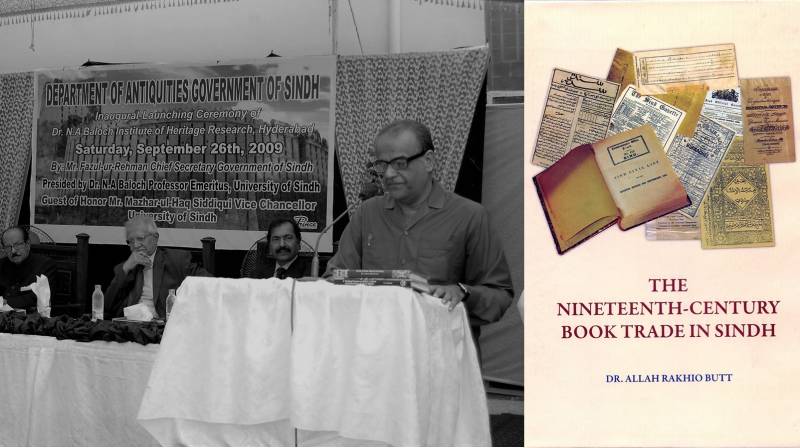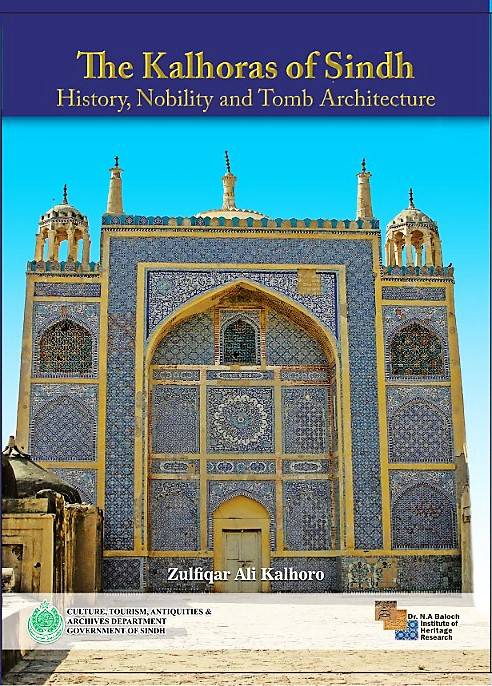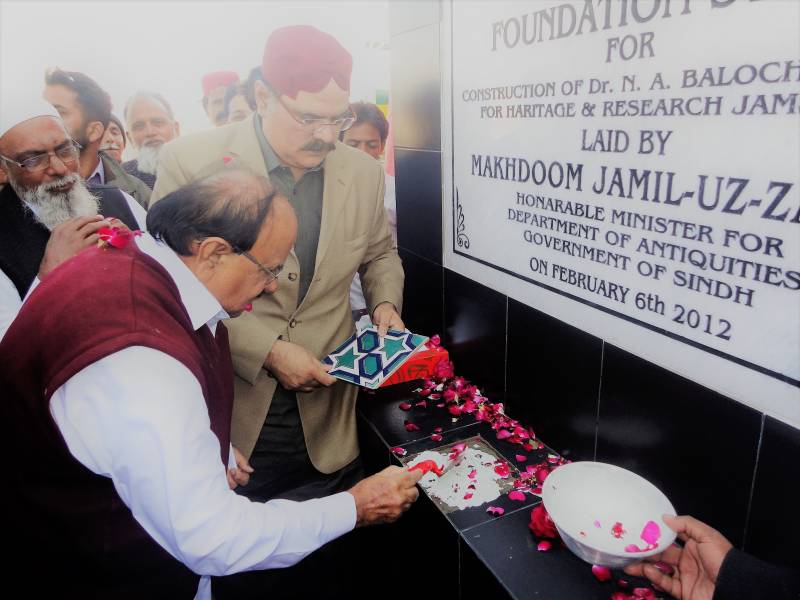
If any scholar’s academic interest is Sindh – culture, ancient geography, folklore, history, and Sindhi literature – in general, it is almost impossible for him/her to avoid stumbling upon Dr Nabi Bux Baloch’s books, articles, and compiled and edited works. A person with diversified interests; nevertheless he has outstandingly contributed in the field of folklore. And he has worked on collecting his encounters and memoirs, the poetry of Shah Abdul Latif Bhitai, dictionaries, encyclopedias, Sindhi classical poetry, the history of Sindh, Sindhi language, music and Sindhi literature, Persian language, Arabic language and biographic literature, Urdu language, and edited and introduced various anthologies and a diversified range of subjects.
Last week, I was reading some reports about Banbhore’s historical sites, and it was a pleasant learning experience for me that Dr Baloch also encouraged archaeologists in the excavation of Sindh’s archaeological sites – including Brahmanabad or Mansurah. Recently, I met a group of field researchers belonging to the fields of anthropology, history and heritage. Interestingly, all of them registered Dr Baloch as a world-class Sindhologist. I still remember one scholar’s words that “Baloch Sahib has set a high standard for young scholars, particularly in the diversity of subjects that he addreses.” Another scholar, who also frequently visits Sindh’ heritages sites, commented that whenever he has visited a distant coastal village of Sindh or a tiny hamlet in the Thar desert, according to the villagers, the first scholar to visit them was Dr Nabi Bux Baloch.
Without a doubt, the Sindh Government honoured the great scholar and established an institute in his name on 26 September 2009. The encouraging aspect of this initiative was that it was established during his lifetime. Therefore, I was eager to learn about the objectives of the institute. In fact, I wanted to understand Dr Baloch’s academic priorities because the institute was formed during his lifetime. Thus, I intended to get a clue about his vision or to understand what research agenda he has set for scholars of the upcoming days.

In this context, I called Dr Altaf Jokhio, who heads the institute as the director, and visited him. In response to my question, he told me that the objectives of the institute revolve around the broader goal of heritage. He added that the name of the centre also highlights its vision: it is called the Dr NA Bux Baloch Institute of Heritage Research. He elaborated that the centre’s broader vision could be unpacked into sub-themes and these include cultural heritage (documentation of historic buildings, monuments, artifacts, traditional practices, rituals, languages, music, and folklore), archaeological heritage (investigation and preservation of archaeological sites, artifacts, and the understanding of past human societies through material remains), natural heritage (study and preservation of natural landscapes, ecosystems, biodiversity, and their ecological or aesthetic value), built heritage (encompassing the preservation and exploration of historic buildings, urban areas, landmarks, bridges, and infrastructure), and industrial heritage (the preservation and documentation of industrial sites, machinery, infrastructure, and the development process of economies).
In response to my last question about the institute’s challenges apart from administrative and financial problems, Dr Jokhio candidly shared that meeting people’s expectations is a challenge in real sense. He explained that Dr Baloch’s work as an individual scholar is immensely diversified, and its scope is too broad, thus people expect the same level of output from the institute that is established in his name.
Dr Jokhio’s openness encouraged me to know more, so I inquired about the mechanism to realise these sub-themes or vision. He told me that the institute implements its vision through yearly scholarships for the research topics discussed earlier. He added that these scholarships are offered to scholars pursuing MPhil and PhD degrees, and financial support is offered to two scholars dedicated to working on various dimensions of Sindh. Additionally, the institute also offers post-doctoral fellowships. Amidst the conversation, Arshad Baloch, who is a senior officer at the institute, joined in and added that one of the activities of the centre in realising its vision is to publish works related to the institute’s themes and also commission research on topics that fall into these themes. He mentioned that the institute has already published 32 books. Immediately, he shared a printed copy of the list with me and showed me Dr Allah Rakhio Butt’s book The Nineteenth-Century Book Trade in Sindh. It was Dr Butt's thesis submitted to the University of Wales, UK.
I flipped through the pages of the book and quickly read its contents. It had chapters on “The book before the coming of the Press,” “European-owned Newspapers,” “Indian-owned Newspapers,” “Book publication: English and Vernacular,” “Government and Press,” “The Technical Problem of Printing – Book selling,” and “Conclusion.” Additionally, the appendices section included two lists that could interest readers: one listing European-owned newspapers and journals published from 1855 to 1900, and the other listing Indian-owned newspapers and journals published from 1845 to 1900.

Arshad Baloch mentioned that another activity that paves the way for realising the institute’s vision is to hold heritage-related conferences. He informed me that the institute recently organised its eighth annual International Conference, with the theme of “Endangered Heritage of Southern Sindh with special reference.” He explained that during the conference, scholars spoke about the coastal heritage of Sindh and the heritage of Karachi city. He quoted Arif Hasan, who pointed out that the city planners and politicians are in a hurry to destroy heritage. Arshad Baloch added that Arif Hasan highlighted that one site that once existed in the area is now covered by a portion of Gulistan-i-Jauhar, and Bath Island’s site has been destroyed by officers’ housing colonies. He further elaborated that the institute plans to preserve and document Sindh’s heritage through collaborative projects with other institutes.
According to Dr Altaf Jokhio, one activity of the institute is to make yearly recommendations for the Dr NA Baloch Awards, which are conferred by the Government of Sindh in February. These awards are given to individuals who have excelled in research/work in the field of physical heritage and history, as well as to scholars who have contributed to the conservation of physical heritage in Sindh. The awards include cash prizes. Dr Jokhio mentioned that the institute is managed by a director and has an advisory board. Before concluding my conversation with the soft-spoken scholar Dr Jokhio, I inquired about the institute’s future plans. He mentioned that the institute’s vision and diverse themes encourage him to initiate various schemes, such as conducting basic trainings for students in subjects like history, archaeology, anthropology, geography, research methods and archive studies. He added that this would be a new initiative, while the original plans of the institute would continue. He expressed confidence in the existing administrative infrastructure but mentioned the need for additional funds to carry out the envisioned activities. He explained that the current budget is merely enough to sustain the institute but not sufficient to continue even book publications or commission essential research, which are key objectives of the institute.
When asked about the five-year plan if sufficient funds were available, Dr Jokhio took a moment to think and then shared his ideas. He mentioned that the plans and schemes are approved by the advisory committee, but as the director, his five-year plan would include the following programs: a) capacity building of young professionals in the preservation and conservation of heritage sites and artifacts. The focus would be on developing modern techniques and methodologies for their preservation, conservation, and restoration, b) community engagement program, which would involve training scholars to actively involve local communities in heritage preservation, management, and decision-making processes. This initiative aims to expand knowledge about local people's values, knowledge systems, and traditional practices related to heritage, c) digital heritage and technology program, which would enhance the learners’ skills in areas such as 3D scanning, virtual reality, augmented reality, and digital archiving, d) integration of heritage and sustainable development goals, where the project would examine how heritage resources can contribute to local economies, community well-being, and environmental sustainability. This initiative would explore heritage-based tourism, cultural industries, and the potential of heritage for poverty alleviation and social inclusion and e) heritage and identity program, inviting scholars to explore how heritage can play a role in shaping individual and collective identities.
In response to my last question about the institute’s challenges apart from administrative and financial problems, Dr Jokhio candidly shared that meeting people’s expectations is a challenge in real sense. He explained that Dr Baloch’s work as an individual scholar is immensely diversified, and its scope is too broad, thus people expect the same level of output from the institute that is established in his name.
In fact, it would seem that we are trapped into triangulation – having to cope at once with the volume of Dr Baloch’s work, people’s expectations and the institute’s limitations.

